Text To Binary
Text To Binary is a tool for converting plain text into binary code, which consists of zeros and ones.
Share on Social Media:
How to use the Binary Converter?
Time needed: 1 minute
- Enter the Text
Type or paste Text in the first field.
- Press the Convert button
Press the Convert button to get the text converted to binary code.
- Review the Output
The binary code output will appear in the second field.
- Copy or Save the Binary Code
Optionally, you can Copy the output to clipboard, or Save it as a file on your device.
Converter Features
| 🔤 Text Input length: | Unlimited |
| ⚡ Conversion Speed: | Instant! |
| ➡️ Binary Output: | Display, Copy, Save |
| 🎯 Conversion Accuracy: | 100% |
Read (or watch) our tutorial on How to Convert Text to Binary to learn more about the text to binary code conversion process.
Use the Binary to Text Translator to convert binary code back to plain text.
Once you have your text converted to Binary code, you can also convert Binary to Hexadecimal (and do the opposite too: convert Hexadecimal to Binary).
How to Convert Text to Binary
Ready to learn how to translate text to binary? It’s just a matter of simple math, with a little help from ASCII – that is, the American Standard Code for Information Interchange. If you’ve got a particularly large chunk of binary code, you can quickly translate it to English with the ASCII to binary converter located at the top of this page.
English to Binary
There are ASCII and binary representations for a variety of characters; spaces, punctuation, and letters. For now, we’ll focus on how to translate text binary, using letters only. The first thing we need is a word. Let’s use “dog”, because who doesn’t love dogs?
We have to break down the word into each individual letter; d o g, and reference our ASCII table. In ASCII, there is a decimal assigned to each character. It’s important to remember that uppercase and lowercase binary and decimal outputs are not identical. Otherwise, the computer reading the binary code wouldn’t know which letters to capitalize. Let’s have a look at the ASCII table. Note that this is just a portion of the table. You can find extensive ASCII to binary tables online; on this site you will find tables of ASCII alphabet to binary for both lowecase and uppercase letters.

We can see the characters d o g correspond to the decimals 100, 111, and 103. The only thing left to do to turn our text to binary code is convert the decimals to binary. Beginning with 100, we need to redefine the number using powers of 2.
Since 100 isn’t a power of 2, find the power of 2 that is equal to or less than 100. We can redefine 100 as 64 + 36. Since 36 isn’t a power of 2 either, we’ll need to redefine it as well. Lucky for us, 36 can be redefined as 32 + 4; more powers of 2.
Starting with 20, let’s count which powers of 2 we used, and indicate them with a one. Powers of 2 not used are indicated by a zero.
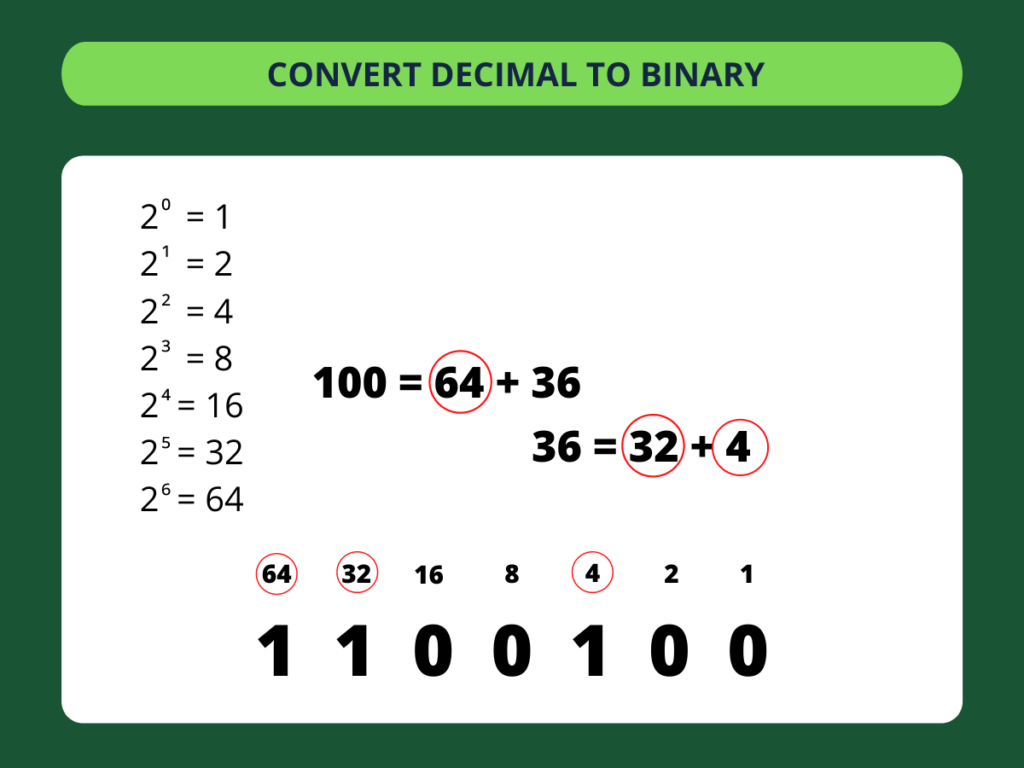
So, our binary output for 100 is 1100100. Now, let’s do the same with 111 and 103.
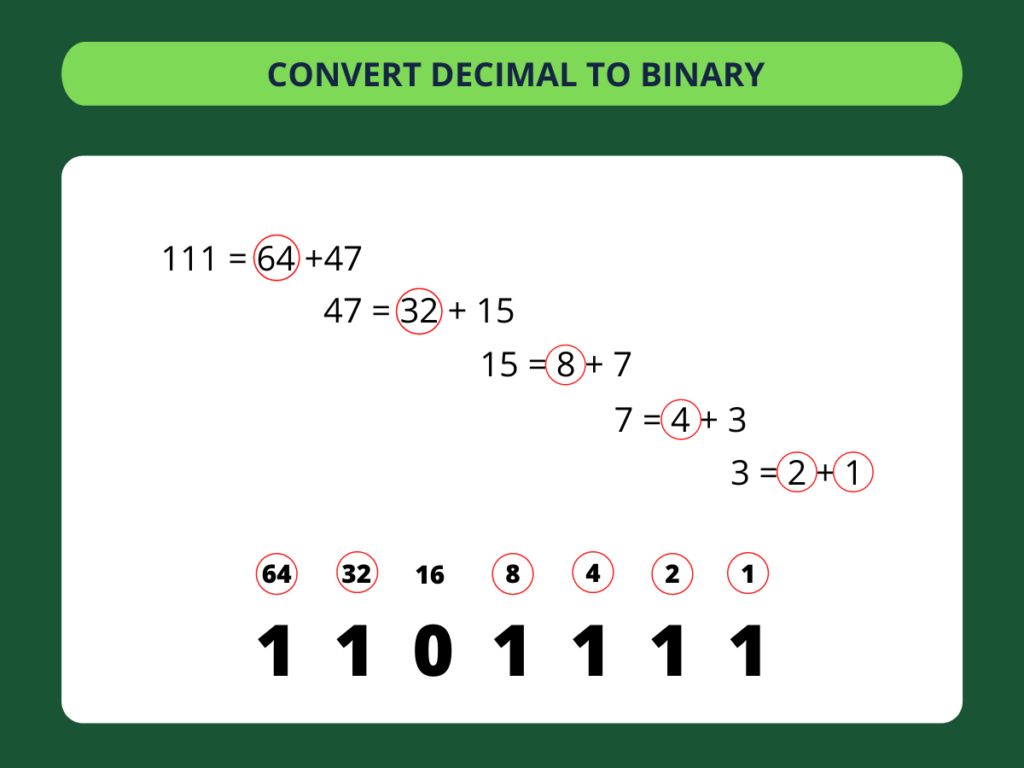
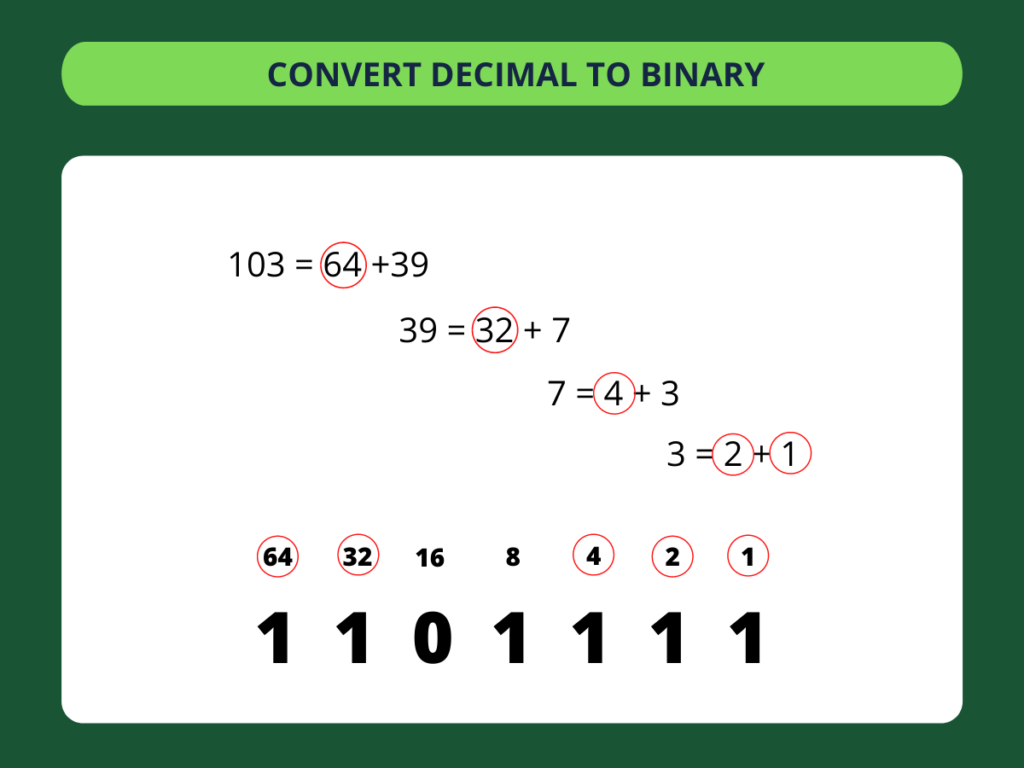
In binary, a letter is always represented by one byte of eight bits, or digits. But our binary output is only seven digits. How do we fix this? Quite easily – we tack on a zero at the beginning of the string. When you use a text to binary converter, this step is done automatically.
Why a zero? We can’t use a one without changing the entire value of the binary code. And in binary, text characters always begin with 010 or 011. 010 will indicate an uppercase letter, and 011 will indicate lowercase. We know our letters are lowercase, and if we add that zero, we have the 011 prefix to prove it! Now that we’ve added the zero, let’s see what our binary code is. In binary, “dog” looks like this: 01100100 01101111 01100111.
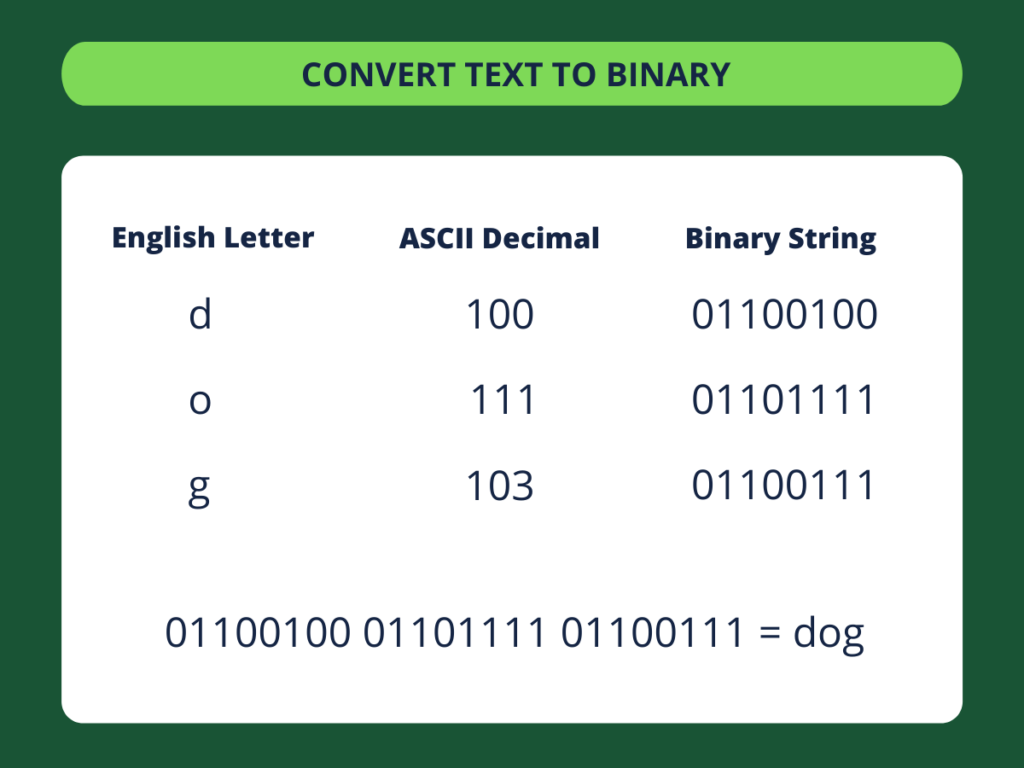
If you want to insert a space into your text, there’s binary code for that, too. Simply hitting the space bar between characters doesn’t actually denote a space. If we want to add a second word to our phrase, we need the the binary string “00100000” to separate words.
Imagine we want to say “good dog”. First, we need to find the decimal value of the first word. Using ASCII, “good” is represented by 103, 111, 111, and 100. It’s the same decimals from the first word, dog, so you already know their binary output. Just rearrange them, and you can spell “good” in binary.
Now, let’s put them all together, and don’t forget the string we need for a space between the two words. You can use the text to binary translator on this page to see how it should look. As you’ve probably figured out, it’s a lot of binary for a short phrase. An English to binary translator is useful if you have a large text to convert.
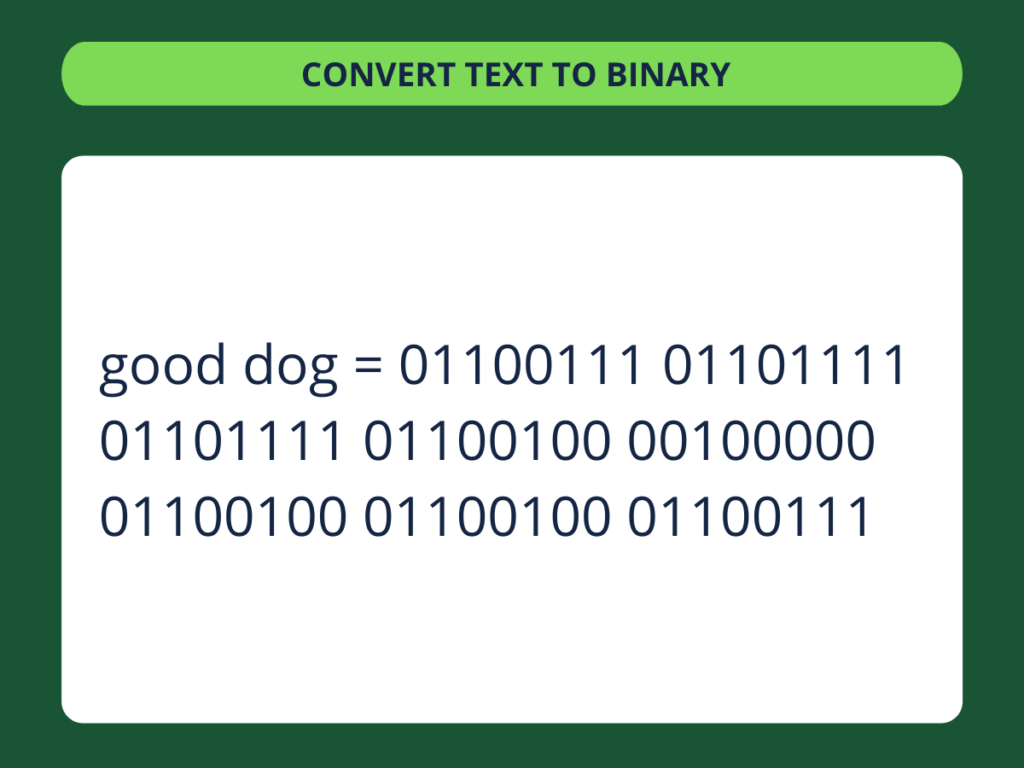
Questions and Answers about Converting Text to Binary
👉 How do you use the Binary Converter?
The Binary Converter at ConvertBinary.com is really easy to use.
It just takes one simple step: enter (or paste) the text in the first field.
Words will be converted on the fly, and the binary code for your text will immediately appear in the field below.
✏️ How do you convert Text to Binary?
To convert English words (or any ASCII text) to binary, you have two options: you can either use an online converter (like the one provided for free by ConvertBinary.com), or you can do it manually.
If you want to learn how to convert binary code to text manually, you can read this guide, or watch the accompanying tutorial.
⚙️ How does the Binary Converter work?
That’s very simple: for each character of the input text (e.g. letters, numbers, punctuation), it references the ASCII table to determine the numeric ASCII code for that character.
Then, it simply performs a number conversion from decimal to binary.
📄 Can I convert Binary to Text?
Of course (provided that your binary code is representing ASCII characters)!
If you need to convert any binary-encoded text to ASCII, you can use the Binary to Text Translator at ConvertBinary.com.
😃 How do I write my Name in Binary code?
You just need to convert each letter of your name to binary.
Try the Text to Binary converter over at ConvertBinary.com to instantly convert your own name to binary code!
👋 What is “hello” in Binary Code?
The word “hello” in binary code is: 0110100001100101011011000110110001101111. By dividing this into eight-digit segments it is easier to see the binary byte corresponding to each letter: 01101000 01100101 01101100 01101100 01101111
🔧 What are some practical applications of converting text to binary code?
Converting text to binary code is used in various applications, including data encoding, computer programming, and digital communication systems. It’s essential for representing data in computing processes, network protocols, and data transmission. Binary representation allows for storing text in electronic devices, transmitting data over the internet, and creating secure encryption protocols.